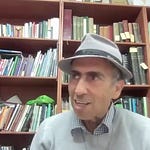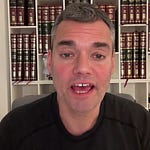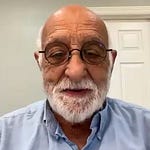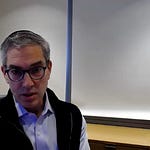A list of ways to help Palestinians in Gaza and the West Bank.
This Friday’s Zoom call will be at 1 PM Eastern, our usual time. Our guest will be Chapman University Professor Emeritus Nubar Hovsepian, author of the new book, Edward Said: The Politics of an Oppositional Intellectual. We’ll talk about Professor Hovsepian’s insights into Said, his close friend, and about what we might learn from Said’s work for this moment in Israel-Palestine and the United States.
Ask Me Anything
Our next Ask Me Anything session, for PREMIUM subscribers only, will be this Wednesday, November 12, from 1-2 PM Eastern time.
Cited in Today’s Video
Rabbi Chaim Steinmetz’s message to his congregation that after Mamdani’s victory, life for New York Jews is “beginning to feel like the 1930s.”
Jason Sokol’s, There Goes My Everything: White Southerners in the Age of Civil Rights, 1945-1975.
Things to Read
(Maybe this should be obvious, but I link to articles and videos I find provocative and significant, not necessarily ones I entirely agree with.)
In Jewish Currents (subscribe!), I argued that Zohran Mamdani’s victory may herald a coalition between anti-Zionists and liberal Zionists that can transform the Democratic Party.
Why the polls may understate Mamdani’s share of the Jewish vote.
Yeshayahu Leibowitz, 50 years ago, on last week’s Parsha, Parshat Vayeira.
Rabbi Aron Wander on the psychotheology of American Zionism.
I’ll be speaking on November 10 at Cornell University and Congregation Tikkun v’Or in Ithaca, New York and on December 8 at the Society for the Advancement of Judaism in New York City.
Reader Response
I occasionally publish letters from readers who take issue with something I’ve said. This one comes from Sophia (last name withheld):
I’ve been reading your coverage of Mamdani and although I think a lot of it is very fair criticism of establishment Judaism, respectfully, I think you are missing one major point. Speaking only for myself, I can tell you that I *hate* Cuomo, and that the idea of voting for him is repellent to me. I too hate the Islamophobia that is showing in our community, and I hate the message that sexual harassment is acceptable in a way that antisemitism is not. These messages are embarrassing and offensive to me.
Two things can be true at the same time, though. I have no issue with people being so-called critical of Israel, and of that criticism having grown in intensity in the last two years (it certainly has for me). However, I find Mamdani to be monomaniacally obsessed with Israel and its crimes in a way that I find concerning and even antisemitic. When people say what about North Korea, China, Sudan, etc., I don’t find that to be an excuse for Israel’s behavior. But when he identifies Israel in one way or another as the source of most evils here in the US, I think that is suspicious. Israel is not the cause of racist policing in the U.S., that predates Israel! I am not assuaged by him promising to protect synagogues; that would be his job as mayor, not a favor he hands out to Jews. If he is so concerned (correctly) about affordability in the city, stop campaigning on your commitment to defund the Technion; it is basically a dog-whistle at this point for the anti-Israel and even antisemitic Left (which are two descriptors that I distinguish between, as I don’t believe being anti-Israel is necessarily antisemitic)
See you on Friday,
Peter
VIDEO TRANSCRIPT:
So, there’s a rabbi on the Upper East Side of New York named Chaim Steinmetz. He is the rabbi of a synagogue called Kehilath Jeshurun. It’s probably the most prominent Orthodox synagogue on the Upper East Side of New York. It’s one of the most prominent Orthodox synagogues in all of New York, in fact, in all of America.
And after Zohran Mamdani’s victory in last week’s election for mayor of New York, he wrote in a letter to his congregants, ‘it’s beginning to feel like the 1930s.’ It’s beginning to feel like the 1930s. He’s not the only person who feels this way. A prominent rabbi in the Hamptons on Long Island announced that he’s going to build an entire Jewish Day School, because he’s expecting so many Jews to flee New York City in fear, and come out to Long Island, and he’s going to build a day school for their children.
Now, for many, many people, many non-Jews, but also many Jews, many progressive Jews, this is baffling. It’s just really, really hard to understand how people could look at Zohran Mamdani, a guy who won at least a third of the Jewish vote, a guy who’s got tons and tons of Jews in his campaign, a guy who speaks again and again and again about Jewish safety and about his opposition to antisemitism, a guy who smiles constantly, that they would feel this level of terror just because Mamdani believes that Israel should be a state in which Palestinians and Jews are treated equally.
But it’s important to try to understand the reason for this terror, which I think in many, many people’s cases is actually genuine. And it’s also really important to understand that this is not… this kind of terror is not a particularly Jewish story. It’s not a particularly Jewish phenomenon. I think it’s important to emphasize that because the exceptionalization of Israel and Jews, I think, can lead to antisemitism.
I think the best way to understand this terror is by recognizing that people who become very invested in political systems of group supremacy, in which one group, a religious, ethnic, racial group has supremacy over another, that when you become deeply invested in that, you associate your safety, your identity with that system. The prospect of equality comes to seem extraordinarily frightening. Indeed, equality becomes, in a way, tantamount to death. The prospect of equality is associated with death, or at least subjugation.
And this is not particular to Jews who identify very, very strongly with the political system of the state of Israel. It’s, I think, common to groups of people who have become accustomed to a system of religious or racial or ethnic or group supremacy. So, a couple of quotes actually from my book, Being Jewish After the Destruction of Gaza:
· In 1998, when the Good Friday Accords were signed, which gave Catholics equality in Northern Ireland, the Protestant leader, Ian Paisley, called the Good Friday Accords a prelude to genocide.
· In 1979, there was a poll of White South Africans, which found that 84% of White South Africans believed that if there were a Black government in South Africa, ‘the physical safety of Whites would be threatened.’
· There’s a wonderful book about White Southerners during the Civil Rights Movement by the historian Jason Sokol. It’s called There Goes My Everything, White Southerners in the Age of Civil Rights, 1945 to 1975. And Sokol writes, ‘they thought in terms of White supremacy or Black supremacy. If Blacks gained rights, Whites would correspondingly wear the yoke.’
This, I think, is what we see in the reaction to Zohran Mamdani. We see it among Jewish Israelis, but we also see it among Jews in New York and other places who are very, very strongly identified with Israel’s political system, the idea that equality actually means the subjugation or even death of Jews.
Now, of course, this is increased by the history of Jews that we have, of a deep history of oppression, persecution, indeed genocide. But you notice that even groups like, let’s say, Protestants in Northern Ireland, or White South Africans, or White Southerners, who don’t have as dark a history of persecution as Jews do, still tend to see things the same way. That they look at someone like Nelson Mandela or Martin Luther King or the Catholics in Northern Ireland, and they don’t see people striving for equality. They see people striving for their subjugation, and they’re particularly reinforced in that by the fact that these people who, you know, represent subordinate groups often have a great deal of anger towards these systems of supremacy, and in many cases, even are involved in acts of violence.
And I think it’s in that framework that you can start to understand why people can look at Zohran Mamdani, and they might recognize that he seems like a nice guy, that he smiles a lot. They may even recognize that some Jews like him, that he’s got Jews in his campaign, that he says he’s against antisemitism. But none of that really penetrates if you very deeply associate the system of Jewish supremacy with your very safety. And so, when you see—and these people are right to recognize that Zohran Mamdani is an opponent of Jewish supremacy. As he said, he doesn’t believe that Israel should be a state that gives Jews legal privileges over Palestinians. He believes that all states should be based on a system of equality under the law.
And although many Jews in New York are very accustomed to that idea—and even would support that idea in the United States—their strong association with a system of Jewish supremacy in Israel means that it doesn’t matter how much Mamdani smiles, and it doesn’t matter how many, you know, left-wing Jews he hangs out with. What he is proposing to do represents an enormously dangerous threat to the safety and well-being of Jews in Israel, and indeed, by extension, Jews around the world.
And unless one actually confronts this basic association of supremacy with safety, and the association of equality with subjugation or death, I don’t think you’re going to be able to understand or effectively respond to statements like Rabbi Chaim Steinmetz, where he says New York is like Nazi Germany.







